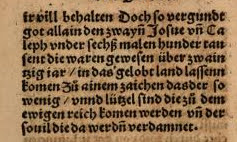The question is on the highlighted verb forms in this passage from Der arme Müllerbursch und das Kätzchen (1857), as collected by the Grimm brothers.
In it, Hans agreed to serve a talking cat for seven years in exchange for a horse.
Einmal sagte sie zu ihm [i.e. Hans] „geh hin und mähe meine Wiese, und mache das Gras trocken,“ und gab ihm von Silber eine Sense und von Gold einen Wetzstein, hieß ihn aber auch alles wieder richtig abliefern. Da gieng Hans hin und that was ihm geheißen war; nach vollbrachter Arbeit trug er Sense, Wetzstein und Heu nach Haus, und fragte ob sie ihm noch nicht seinen Lohn geben wollte. „Nein,“ sagte die Katze, „du sollst mir erst noch einerlei thun, da ist Bauholz von Silber, Zimmeraxt, Winkeleisen und was nöthig ist, alles von Silber, daraus baue mir erst ein kleines Häuschen.“ Da baute Hans das Häuschen fertig und sagte er hätte nun alles gethan, und hätte noch kein Pferd. Doch waren ihm die sieben Jahre herumgegangen wie ein halbes. Fragte die Katze ob er ihre Pferde sehen wollte? „Ja“ sagte Hans. Da machte sie ihm das Häuschen auf, und weil sie die Thüre so aufmacht, da stehen zwölf Pferde, ach, die waren gewesen ganz stolz, die hatten geblänkt und gespiegelt, daß sich sein Herz im Leibe darüber freute.
If you need more context, please follow this link for the full story.
QUESTION
Question 1. Shouldn't the two clauses have gone as follows?
die waren ganz stolz, die blänkten und spiegelten
Question 2. If yes to 1 ordinarily but the story is aiming at some particular effect through the choice of tense, please explain what the effect is.
BACKGROUND
It seems to me that the die-clauses are describing what Hans saw once the door was open and should be contemporaneous with the daß-clause.
As is, they would be a description of the condition of the horses at a more remote past than the time of the daß-clause.

